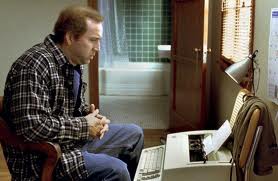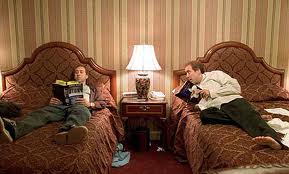 By Charles Harris The latest instalment of How to write your next script - click here for article 1 - The Seed Image In the last article of this series you finally read your first draft, with all the roller-coaster feelings that a first reading brings. It's now time to begin the second draft. If you've seen a lot that needs doing, this may seem daunting - the trick is to approach it step by step. Step by step Over many years of editing first drafts, I've learned not to try get it all right in one go. The only way that works for me is to take each element turn by turn. By focusing on just one element on each pass, you take an enormous amount of pressure off. So for the first edit, we focus solely on the structure. It doesn't matter, at this stage, how good or bad the dialogue is, whether the characters are consistent or the descriptions cinematic. That's all for future drafts. In short, what I call (to the outside world) a "second draft" will probably be made up of six or seven mini-drafts. For the first of these, I simply concern myself with whether the story is being told in the right order, at the right pace. It's far too unwieldy to do all this to the whole dialogue script, so my second draft is usually a short synopsis. It might be a short as one page or as long as five, but it shows me how the structure of a new draft might look in simple terms. The structure redraft  Now, there's a lot of hot air created about structure, especially three act structure. I'm not going to get into that, except to say that the big mistake is to think there is one "right" structure for every story. The job of the second draft is to find organically what structure your story needs, not to impose one. In some cases, the right structure might indeed be three acts. Or it might be two acts (Full Metal Jacket), seven acts (Se7en), twelve episodes (Goodfellas), multistranded (Crash), flashback (Sunset Boulevard, The Usual Suspects, Pulp Fiction), circular (Tree of Life) or just about any permutation you can think of. However, whatever your story, certain structural needs will almost always be there. Questions, questions! So now ask yourself the following questions: 1. Does the story get going from the beginning? I guarantee that there will be numerous scenes at the start which are there to "set up" things that are coming later. The trouble is, an audience pays to watch a whole movie or TV drama - not just the bit that follows 45 minutes of "setting up". Set up scenes are boring. You have two choices. Ditch them now or ditch them later. (Guess which I recommend). Don't worry for the moment how the audience is going to know all that crucial stuff you want to tell them. Your aim is to get a story going from the very first half page. 2. Do the key moments happen when they should? No matter what your "act" structure, by page 10, the audience should begin to have an inkling of what the central issue is going to be. If not, they are going to get very twitchy. By page 30, the protagonist must have faced disaster and made a crucial decision that will lead to the rest of the plot. It can happen earlier, but any later and you'll have problems keeping your viewers watching. Around 20-30 pages from the end, we should have realised where the final resolution is going to take place and be on the edge of our seat waiting for it to happen. You can break those rules, but even the greatest writers rarely do. And when they do, they make sure they know why and how to get away with it. 3. If not, should I be cutting more scenes? Every first draft I ever see has far too much at the start and far too little at the end. (Including my own). The story starts around page 45. The big decision lurks on page 90. The final climax is squeezed onto the last five pages. It's time to get ruthless. If not, the people you try to sell your script to will be ruthless instead... Put those key moments where they are supposed to be. Cut the setting up scenes you were leaving till later. Now, with the space you've created, you can push your protagonist further than she thought she could ever go. Plan it out Now work your new structure into a brief outline to see if it works. Adjust as necessary. You've done your second draft. Easy, wasn't it. As long as you have a ruthless determination and very sharp pair of scissors! <Previous - How to read your script Next - Character> Charles Harris is an experienced award-winning writer-director for cinema and TV. His first professional script was optioned to be developed by major agents CAA in Hollywood and he has since worked with top names in the industry from James Stewart to Alexei Sayle. His books Complete Screenwriting Course and Jaws in Space: Powerful Pitching for Film & TV are recommended reading on MA courses.
0 Comments
|
BLOGTHE ONLY PLACE TO TALK ABOUT THE CRAFT OF SCRIPTWRITING. Archives
November 2023
|
Privacy Policy © Euroscript Limited 2020

 RSS Feed
RSS Feed


